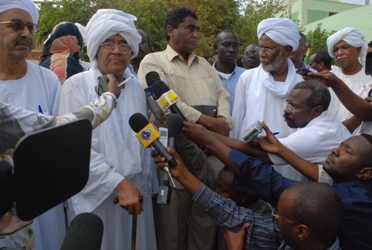Sudan’s NCF, SRF call for independent committee to facilitate national dialogue
April 8, 2014 (KHARTOUM) – Sudan’s opposition umbrella organisation of the National Consensus Forces (NCF) and the rebel Sudan Revolutionary Front (SRF) have underscored the need to reach a comprehensive solution to the country’s crises and renewed call for establishing a transitional government and an independent body to facilitate the national dialogue.

But the Arab Ba’ath Party representative at the NCF, Mohamed Diaa Al-Din, objected to the statement, saying he did not read it despite his approval for its content.
According to the statement, a peaceful solution and constitutional process require creating an atmosphere conducive for dialogue and applying genuine confidence building measures including ending war, addressing humanitarian crisis, annulling all laws restricting freedoms, and moving from war and totalitarianism to peace and democracy.
The statement stressed the need for agreeing on an independent mechanism to administer dialogue among all parties and identifying necessary actions for a serious and productive dialogue, calling for agreement on a clear roadmap which leads to transitional arrangements and an interim government to carry out what will be agreed upon.
It further demanded holding a constitutional conference with the participation of all political and social forces without exclusion in order to arrive at comprehensive solutions for Sudan’s crises and drafting a democratic elections law.
The statement also emphasised that contacts and consultations between the NCF and SRF will continue in order to arrive at a joint program that meets interests of the Sudanese people.
The Sudanese president Omer Hassan Al-Bashir announced a series of resolutions at the onset of a political roundtable held on Sunday in Khartoum with the participation of 83 political parties.
The NCF forces boycotted the political roundtable, saying the government did not respond to its conditions for creating an environment conducive for dialogue.
Bashir instructed authorities in the states and localities across Sudan to enable political parties to carry out their activities inside and outside their headquarters without restrictions except those dictated by the law.
The Sudanese president also pledged to enhance press freedom so that it can play its role in the success of the national dialogue unconditionally as long they abide by the norms of the profession.
Political detainees who have not been found to be involved in criminal acts will be released, Bashir added.
He also stressed the government’s commitment and willingness to allow rebels to participate in the national dialogue and vowed to give them adequate and appropriate safeguards to attend and depart safely afterwards.
However, on Monday, the Reform Now Party (RNP), which is chaired by a leading dissident from the ruling National Congress Party (NCP) Ghazi Salah al-Deen al-Attabani, announced that the National Intelligence and Security Services (NISS) prevented the party from holding a seminar at the Omdurman Ahlia University (OAU) despite obtaining prior permission.
In a press release on Monday, secretary-general of the rebel Sudanese People’s Liberation Movement-North, (SPLM-N) Yasser Arman downplayed the presidential resolutions and described them as “wordplay”, saying they have no value as long as extraordinary laws continue to exist.
In a televised address to the nation in January, Bashir announced a four-point plan for reform “to stop the war and bring peace, free political society, fight against poverty and revitalise national identity”.
He called for political forces and even rebel groups, on the condition they lay down their arms, to engage in dialogue aimed at meeting key objectives.
NCP officials, including Bashir, have brushed aside opposition calls for the 2015 elections to be delayed and the formation of a transitional government that would work on drafting a new constitution to prepare the country for the polls.
The opposition National Umma Party (NUP) and the Popular Congress Party (PCP) PCP are the only major opposition parties to accept Bashir’s call for national dialogue so far.
Although both parties warned that they would pull out of dialogue with the NCP if progress stalls.
(ST)
